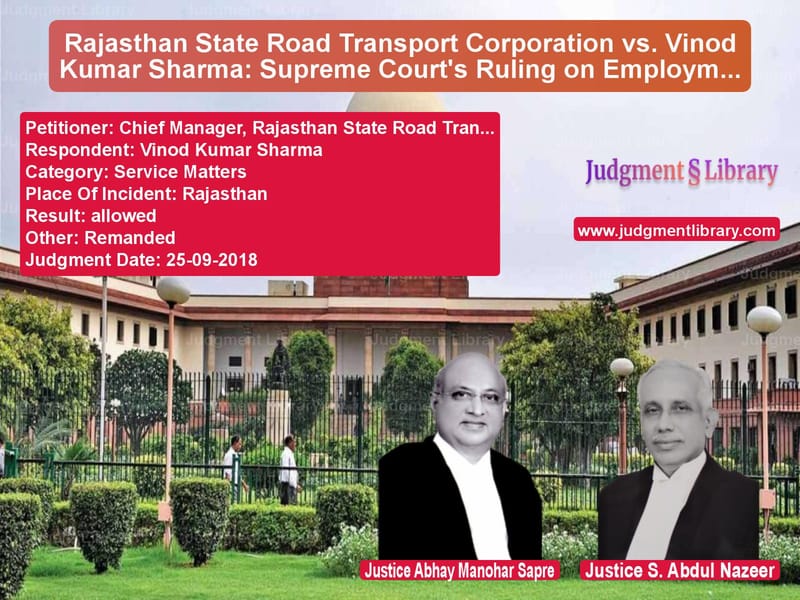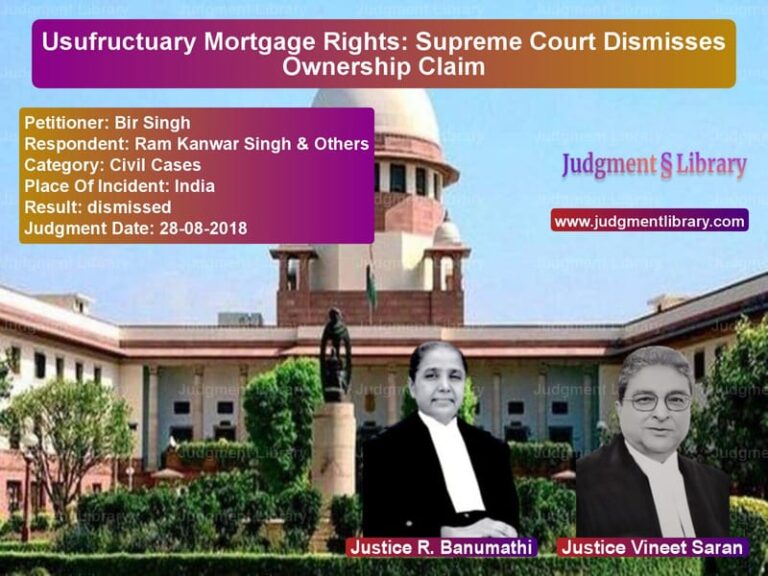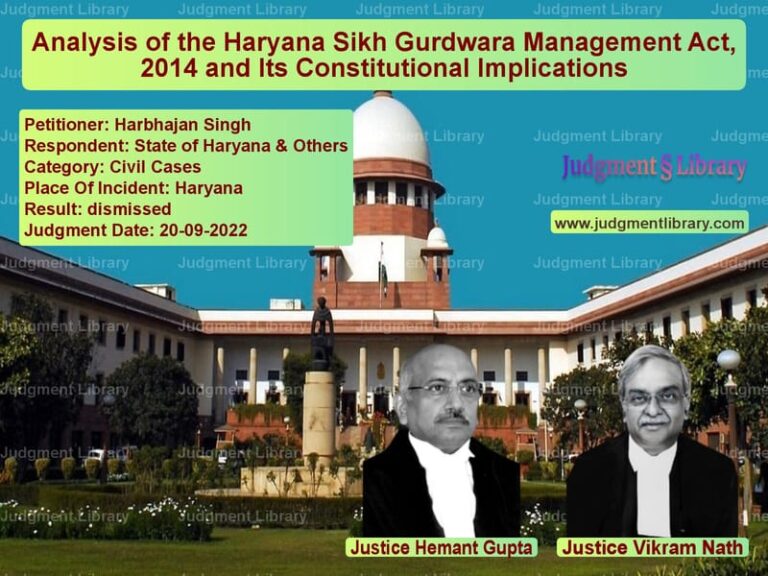Rajasthan State Road Transport Corporation vs. Vinod Kumar Sharma: Supreme Court’s Ruling on Employment Dismissal Dispute
The legal dispute between the Rajasthan State Road Transport Corporation (RSRTC) and Vinod Kumar Sharma, an employee dismissed from service, brought forth crucial questions on procedural fairness in employment dismissals and the role of judicial review in labor disputes. The case, decided by the Supreme Court on September 25, 2018, centered around the dismissal of Vinod Kumar Sharma, a conductor, following a domestic inquiry that found him guilty of misconduct.
Background of the Case
Vinod Kumar Sharma was employed as a conductor with the Rajasthan State Road Transport Corporation. The dispute arose when he was dismissed from service on grounds of misconduct while performing his duties. Following his dismissal, Sharma challenged the decision before the Industrial Tribunal-cum-Magistrate Court, Alwar, which ruled in his favor, leading to RSRTC’s appeal before the Rajasthan High Court.
The case proceeded through multiple stages:
- The Industrial Tribunal examined the legality and correctness of Sharma’s dismissal and ruled in his favor.
- RSRTC challenged this decision in the Rajasthan High Court.
- The Single Judge of the High Court upheld the tribunal’s decision.
- RSRTC then filed a Division Bench appeal, which was dismissed.
- RSRTC finally approached the Supreme Court.
Arguments by RSRTC (Appellant)
The Rajasthan State Road Transport Corporation argued that:
- The dismissal was based on a legally conducted domestic inquiry, following due process.
- The tribunal and the High Court erred in interfering with an employer’s decision regarding disciplinary action.
- The Division Bench failed to address key legal issues and did not provide a well-reasoned judgment.
Arguments by Vinod Kumar Sharma (Respondent)
Vinod Kumar Sharma contended that:
- The disciplinary action was arbitrary and lacked sufficient evidence.
- The Industrial Tribunal rightly ruled in his favor by questioning the fairness of the domestic inquiry.
- The High Court correctly upheld the tribunal’s decision, ensuring justice for an unfairly dismissed employee.
Supreme Court’s Observations
The Supreme Court, while analyzing the case, expressed dissatisfaction with the judgment passed by the Division Bench of the Rajasthan High Court. The Court remarked:
“On reading the impugned order, it is difficult to discern, much less appreciate, the factual and legal controversy in its proper perspective.”
The Court criticized the Division Bench for failing to set out the facts clearly and not addressing the submissions made by both parties adequately. It observed:
“The impugned order has neither set out the facts properly nor the findings of the Tribunal clearly and Single Judge and nor dealt with any submissions urged by both the counsel and nor given its reasoning keeping in view the law laid down by this Court on the issues arising in the case to justify the dismissal of the appeal.”
Final Judgment
Due to the inadequacy of the reasoning provided by the High Court, the Supreme Court remanded the case back to the Division Bench, directing it to hear the matter afresh and issue a well-reasoned judgment. The Court stated:
“For these reasons, we do not wish to probe into the factual and legal issues arising in the case and instead allow the appeal, set aside the impugned order, and remand the case to the Division Bench of the High Court for deciding the appeal afresh on merits keeping in view the aforementioned observations made by us.”
The Supreme Court instructed the High Court to expedite the matter, stating:
“We request the High Court to decide the appeal as expeditiously as possible, preferably within six months.”
Implications of the Judgment
This Supreme Court ruling highlights several important legal principles:
- The necessity of reasoned judgments at all levels of the judiciary to ensure transparency and accountability.
- The importance of procedural fairness in employment dismissals and the role of tribunals in safeguarding employee rights.
- The Supreme Court’s supervisory role in ensuring lower courts fulfill their obligation to provide well-reasoned decisions.
By remanding the case, the Supreme Court reinforced the principle that judicial orders must be clear, well-reasoned, and based on a proper appreciation of the facts and legal issues.
Petitioner Name: Chief Manager, Rajasthan State Road Transport Corporation, Alwar.Respondent Name: Vinod Kumar Sharma.Judgment By: Justice Abhay Manohar Sapre, Justice S. Abdul Nazeer.Place Of Incident: Rajasthan.Judgment Date: 25-09-2018.
Don’t miss out on the full details! Download the complete judgment in PDF format below and gain valuable insights instantly!
Download Judgment: Chief Manager, Rajas vs Vinod Kumar Sharma Supreme Court of India Judgment Dated 25-09-2018.pdf
Direct Downlaod Judgment: Direct downlaod this Judgment
See all petitions in Employment Disputes
See all petitions in Termination Cases
See all petitions in Public Sector Employees
See all petitions in Judgment by Abhay Manohar Sapre
See all petitions in Judgment by S. Abdul Nazeer
See all petitions in allowed
See all petitions in Remanded
See all petitions in supreme court of India judgments September 2018
See all petitions in 2018 judgments
See all posts in Service Matters Category
See all allowed petitions in Service Matters Category
See all Dismissed petitions in Service Matters Category
See all partially allowed petitions in Service Matters Category







